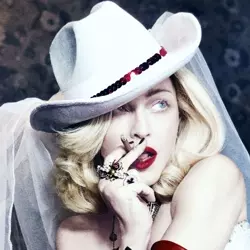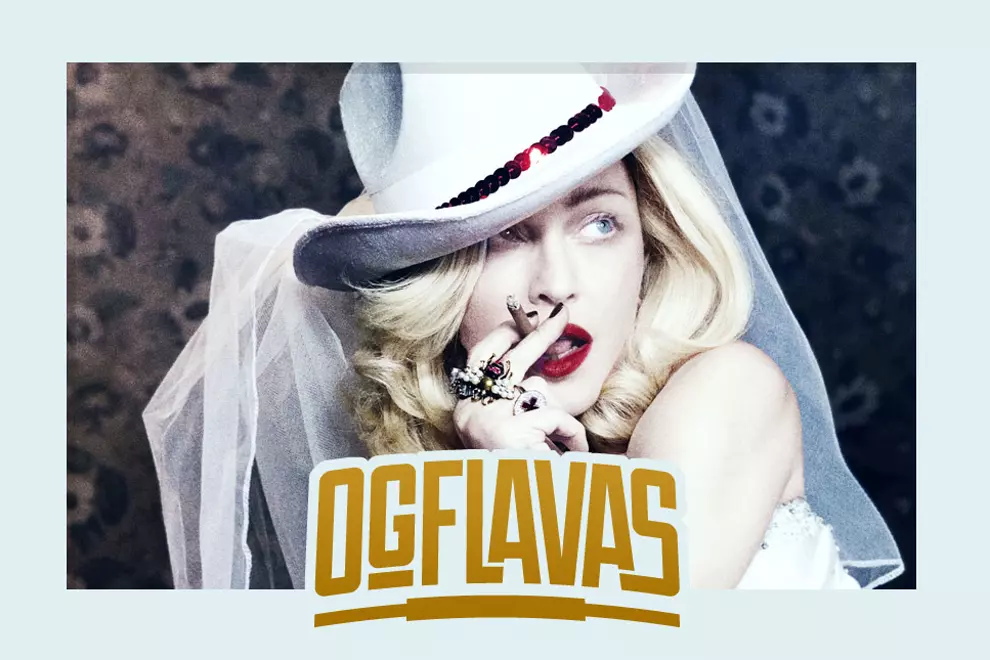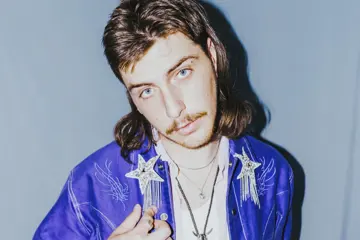 Madonna
MadonnaMadonna is many things. She is the Queen of Pop. She is a revolutionary. She is a serial reinventor. She is a feminist boss. She is an LGBTQIA+ advocate. But, for some, Madonna is a problematic fave. She is a culture vulture. And she is a controversialist. Madonna has been successively cancelled.
Now, with a defiantly arch new album, Madame X, Madonna is casting herself as the mysterious Madame X – masquerade, and performativity, reoccurring motifs in her work. In a promotional visual, she teases, "Madame X is a secret agent. Travelling around the world. Changing identities. Fighting for freedom. Bringing light to dark places." Alas, the concept has been superseded by a narrative not of Madonna's choosing – that concerning her age.
Madonna Ain't Nothing But A Number?
Madonna has previously addressed gendered ageism and the way it functions to invalidate women's credibility. Accepting Billboard's Woman of the Year award in 2016, the superstar delivered a raw speech about her experiences with misogyny. She emphasised, too, how female artists are punished for ageing. "You will be criticised, you will be vilified, and you will definitely not be played on the radio." Madonna concluded wryly, "People say I'm controversial. But I think the most controversial thing I have ever done is to stick around."
Nonetheless, the reviews of Madame X have reductively fixated on Madonna's turning 60. The Guardian's Ben Beaumont-Thomas suggested that (a righteous) temporality has caught up with a Madonna running away from mortality. He writes, "Perhaps it began when she kissed Britney Spears as if to parasitically extract her youth," referring to 2003's MTV Video Music Awards performance. His description evokes Lady Gaga's vampiric Countess in American Horror Story: Hotel, a character modelled on the mythologised Eastern European aristo Elizabeth Bathory, who killed young women. Vanessa Grigoriadis' interview with Madonna for The New York Times, entitled "Madonna At Sixty", similarly dwells on her age as an arbitrary manifestation of control. Madonna expressed her 'disappointment' in the piece on Instagram. "You cant fix society," she posted. "And its endless need to diminish, Disparage or degrade that which they know is good. Especially strong independent women." Madonna's hyper-defensiveness is understandable given the social surveillance of 'age appropriateness'. Curiously, Grigoriadis doesn't quiz Madonna on the equally thorny cultural co-option.
Madonna, The Postmodernist
Don't miss a beat with our FREE daily newsletter
Raised in a working-class, Catholic, Italian-American family in outer-suburban Detroit, Madonna redefined pop for female artists in the '80s – both with her music manoeuvres and imagery. Her message was one of self-actualisation. But Madonna also explored the nexus between gender, sexuality, race, ethnicity and religion. She would become an academic subject. In 2019, Madonna's mode of ironic postmodernism is incompatible with the socio-political awareness prompted by intersectional feminism – her reinventions often involving appropriation. Still, she has used her platform to expose, and boost, marginal creatives and subcultures.
Madonna started as a dancer in New York, studying under Martha Graham. From the outset, the Everybody singer sought streetwise collaborators, liaising with her boyfriend, the Puerto Rican DJ John "Jellybean" Benitez, for 1983's eponymous debut album of post-disco. Gwen Guthrie, a Paradise Garage associate, and Chic's Norma Jean Wright contributed backing vocals. Next, Madonna partnered with Nile Rodgers, who'd funked up David Bowie's Let's Dance, for Like A Virgin. The star showed her flair as a provocateur with the title-track, and flexed an aspirational verve in Material Girl, yet plaintively covered Rose Royce's '70s R&B classic Love Don't Live Here Anymore. Madonna closed the '80s with a cathartic masterpiece, Like A Prayer – the title-track epic gospel (the LP was reissued in March for its 30th anniversary). She duetted with Prince, her male counterpart, on Love Song.
Increasingly, Madonna developed a postmodern feminism centred on the body. She asserted her sexual agency. In the process, Madonna deconstructed those binaristic female archetypes of the virgin/whore. However, she endured a vicious backlash following 1992's synchronised release of the Erotica album and softcore porn book, Sex, from her fledgling entertainment company, Maverick. Traditional feminists accused Madonna of being complicit with the patriarchy in objectifying herself and commodifying female pleasure. Generally, Madonna's ambition, and branding acumen, engendered cynicism about any creative impulse – and her iconoclasm was dismissed as representing opportunistic 'shock value', rather than political purposes. Erotica was overlooked musically – and narratively. Coming off 1990's queer club anthem Vogue, and Justify My Love, Madonna had collaborated with Shep Pettibone to record deep house. The diva assumed the role of Mistress Dita, Erotica offering powerful commentary on sex amid the AIDS crisis.
Ostensibly contrite, Madonna resurfaced with the pastel romance of Bedtime Stories – synthesising New Jack Swing, R&B slow jams, and trip hop. She solicited emerging urban super-producers like Dallas Austin, who helmed the first single Secret, and Babyface (Take A Bow). Nellee Hooper – who, after coming up with Massive Attack in Bristol, had produced Soul II Soul – brought his British club cool to the titular Bedtime Story, a Bjork co-write. Inside Of Me sampled Aaliyah. Additionally, on I'd Rather Be Your Lover Madonna vibed with Meshell Ndegeocello – the neo-soulster, multi-instrumentalist and queer idol an early Maverick signing.
In the late '90s, Madonna pivoted to dance. She morphed into Veronica Electronica for her ambi-psychedelia testimony, Ray Of Light, with Brit composer William Orbit. Madonna received her sole Grammy Album of the Year nomination (won by Lauryn Hill). She subsequently bonded with the obscure French producer Mirwais Ahmadzai for the folktronica Music, reimagining herself as a metro cowgirl. Madonna went electroclash with the socio-political American Life. Then, teaming with Stuart Price for Confessions On A Dance Floor, she donned a leotard and boogied to hedonistic nu-disco – Hung Up sampling ABBA. The serenade Forbidden Love presaged avant 'n' B. Confessions… scored a Grammy for Best Electronic/Dance Album.
In the late 2000s, a diffident Madonna began reproducing trends, over intuiting or interpreting them. She returned to the urban scene for Hard Candy, engaging Justin Timberlake, Timbaland and The Neptunes (who steered the bouncy, Kanye West-blessed Beat Goes On). 2012's MDNA was Madonna's faddish EDM LP, mainly memorable for the symbolic presence of Nicki Minaj and MIA on Give Me All Your Luvin'. In 2015, Madonna aired Rebel Heart – trap among the expansive styles. Her kids as A&R scouts, Madonna hired a host of 'name' producers – Diplo, Avicii and Yeezy – and rappers (Chance The Rapper dubiously accompanied by boxer Mike Tyson on Iconic). Unfortunately, radio ignored even the best single, the ballad Ghosttown.
Madonna, The Globalist
Madame X, Madonna's 14th album, is paradoxical. Living in multicultural Lisbon, Portugal, so her son David can attend an elite football academy, Madonna has tapped into communal Latin influences: reggaeton, Brazilian funk carioca, and Iberian genres such as fado (which Nelly Furtado introduced to wider pop audiences) and the Angolan-derived kuduro. She sings in English, Spanish and Portuguese. Madonna has reunited with Mirwais, the ubiquitous Diplo, and West's cohort Mike Dean.
Several pundits have summarised Madame X as "bizarre". In fact, it's meta, maximalist and theatrical. Madonna's Madame X alter-ego surely recalls Mistress Dita. She revels in her position as pop's OG auteur and curator. But the American bohemian also aims to be woke.
The opener, and lead single, Medellin, is a throwback to Madonna's '80s Latin bop La Isla Bonita – albeit with Mirwais' French touch. Madonna duets with the Colombian reggaeton singer/rapper Maluma – and they share a tangible musical chemistry. Understandably, Madonna has caused disquiet with the line, "We built a cartel just for love." Yet she frames Medellin as a reverie about escaping fame – and scrutiny. "I took a pill and had a dream/I went back to my 17th year/Allowed myself to be naive/To be someone I've never been/I took a sip and had a dream/And I woke up in Medellin/The sun was caressing my skin/Another me could now begin… Sipping my pain just like champagne/Found myself dancing in the rain with you/I felt so naked and alive/For once I didn't have to hide myself." Maluma likewise graces the banger Bitch I'm Loca. (He just dropped his own album, 11:11, with a third Madonna cross-exchange, Soltera.)
In Dark Ballet, Madonna channels her longtime heroine Joan Of Arc – the French warrior martyred on charges of heresy. The song is New Romantic cabaret – its bridge, with Madonna heavily Auto-Tuned, borrowing from Tchaikovsky's The Nutcracker. The star of the poetic video, directed by Emmanuel Adjei (who's worked with Sydney's Mark Pritchard), is art-rapper Mykki Blanco. Blanco's compelling portrayal of Joan allegorises his personal journey, the clip ending with the statement, "I have walked this earth, Black, Queer and HIV positive, but no transgression against me has been as powerful as the hope I hold within." That Madonna intentionally decentres herself is unprecedented. Wilder is Madame X's God Control, a six-minute suite with beat switches that Travis Scott might covet. Here, Madonna decries the failure of US gun regulation. Originating as a piano ballad, God Control ricochets through choral music, Daft Punk disco, then Nina Hagen punk – Madonna crooning with pitch-altered vocals, rapping, Debbie Harry-style, whispering and shouting.
There are bizarre inconsistencies. Madonna cut Future, Diplo-stamped dub-reggae, with Migos' Quavo – the hip hop trio called out for their homophobia. (Madonna popped up on the rapper's track Champagne Rose, alongside Cardi B, off his 2018 solo debut, Quavo Huncho.) In the lament Killers Who Are Partying, Madonna declares herself a universal resistance fighter for various colonised and oppressed minorities – remote altruism peak white feminism.
Madame X demonstrates that Madonna, formerly the Queen of Greatest Hits Compilations, is an 'album' act. A song like Crave, a trap/fado hybrid with gentle acoustic guitar and featuring a romantic Swae Lee of Rae Sremmurd, clicks in context. Madonna has never experimented as much vocally as on Madame X. In the gorgeous Crazy, an accordion-layered bop, she sings, "I bend my knees for you like a prayer," sounding somewhere between the bluesy Janis Joplin and Rihanna. More intimate are the ballads Come Alive, Extreme Occident and Looking For Mercy – all redolent of Ray Of Light – as well as the Erotica-ish house I Don't Search I Find, with Madonna examining her selfhood. And it transpires that Madonna, or Madame X, "a spy in the house of love," is observing us, observing her. Madame X is less the vision of a narcissistic pop queen than one restoring a fractured identity. Indeed, it's Madonna at her most revealing, instinctive, idealistic, camp, satirical, agitated, fearful, knowing, unknowing, and IDGAF. Pointedly, Madame X ends with the anthem I Rise, epitomising collective resilience.
Madonna, The Influencer
Madonna's legacy is undeniable. She launched a feminist movement in pop. Janet Jackson proclaimed her artistic autonomy with 1986's Control (and her sexual emancipation with janet.). In turn, Madonna and Janet inspired the choreographer-cum-singer Paula Abdul, whose 1991 Spellbound should be up there with Like A Prayer. Adina Howard connected the R&B legend Millie Jackson, aka the Godmother of Rap, and Madonna with 1995's nasty af Do You Wanna Ride?. In 2013, Beyonce, who cameoed in Madonna's Bitch I'm Madonna video, commended the Detroiter as a role model. In the meantime, Rihanna has adapted Madonna's template of reinvention, every album signalling a phase.
Madonna's corporeal feminism impacted on female rappers – with Salt 'N Pepa, Lil' Kim (plus her 'playa' peers Foxy Brown and Charli Baltimore), Nicki Minaj and Cardi B espousing sex positivity, in addition to a desire for financial independence and empowerment. Besides, everyone from Yeezy to Taylor Swift to Lana Del Rey have unveiled meta pop projects. Globally, Madonna paved a path for Sweden's Robyn, once deemed a 'Madonna wannabe'; Rita Ora, a Kosovar Albanian refugee; and Spain's ROSALIA (warranting that ignominious appearance at Eurovision).
And Australian artists laud Madonna. Aurelia, generating buzz with her atmospheric electro-pop, tells OG Flavas, "Madonna has always done what she's done against all odds and now battles ageism on top of everything else. Despite that, she is still the OG influencer. For me, personally, she's fearless and the personification of creative freedom."
The Sydney electro-futurist Donatachi (Doug Simmons) stresses the significance of Madonna's boundary-breaking. "The very concept of a sexually-liberated pop icon can be traced back to every rebellious statement she made, risqué photo shoot and controversial video." He feels that, by opening minds, Madonna enabled other auteurs to tackle "taboo" topics in the mainstream. "I grew up enjoying music by artists who had already benefitted from Madonna's dismantling of gender norms and I was exposed to artists who felt more freedom to express themselves thanks to her years of breaking rules. Her ability to filter underground ideas and sounds and bring them to the mainstream with a pop sensibility is something I aspire to and can be heard in every great pop song today."
Simmons jokes that, "Madonna invented eras!" But, pondering on the aesthetics of Ray Of Light, he recognises its protagonist's contradictions. "I obviously have a soft spot for the New Age spiritualism of Ray Of Light. Oh my god, when she explodes into a murder of crows in the Ray Of Light video? That will never not be amazing and camp to me. Looking back, the appropriation of Eastern mysticism is obvs probbo, but I guess she pioneered being a problematic fave too!"
Crucially, Simmons notes Madonna's extra-curricular activity. "She has always been a pioneer in her unwavering support and education about AIDS and has also helped create visibility for the queer community. It's so easy to take her activism for granted today, but she really took a risk in being so vocal for the LGBTQ community during the '80s when supporting marginalised and oppressed people wasn't as fashionable as it is in 2019."
Madonna, The Intersectional Feminist
The takeaway? Pop culture needs to acknowledge the consequences of gendered ageism and toxic generationalism. If the achievements of a privileged white woman like Madonna are devalued, what does that mean for others? The gender gap in retirement savings has been documented as a social challenge, compounded by the fact that, due to age-discrimination in the workplace, women struggle to catch up later. Accordingly, they're at risk of poverty and homelessness.
In 2010, Alan McGee, the founder of Creation Records, blogged for The Guardian, "Move over Madonna, Beyonce is the new queen of pop." He argued that "Madonna has nothing to prove anymore." But, a decade on, Madonna must apparently justify her existence. Seasoned female performers are typically relegated to kitsch heritage status – their domain retro or 'adult contemporary' radio formats or possibly a Las Vegas residency, as with Celine Dion. Many have faded. While Madonna remains resolutely visible, Kate Bush, Siouxsie Sioux and even Sade have all retreated, Greta Garbo-fashion. For black female artists, ageism is another barrier. Mary J Blige may reign as the Queen of Hip Hop Soul, but her recent albums have been slept-on. Though reviewers praised super-diva Mariah Carey's comeback, Caution, a few admitted to holding low expectations. Nicki Minaj's Queen, supposed to celebrate her GOATness, was subsumed into a saga about her feuding with a younger rival in Cardi B. And, latterly, Ciara's Beauty Marks was neglected – crunk & B's MVP 'passe' at 33. Now that's an outrage.
















